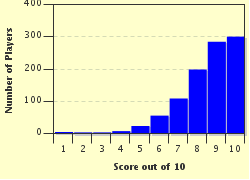Quiz Answer Key and Fun Facts
1. What is the best definition of dementia?
2. Alzheimer's disease is the most common type of dementia. Which of the following is NOT true of Alzheimer's disease?
3. Which of the following is NOT a cause of dementia?
4. In dementia, the loss of long-term memory generally precedes the loss of short-term memory.
5. Which of these professionals is able to diagnose dementia?
6. Which of the following would *not* be useful in diagnosing dementia?
7. What living arrangement is best for a person with dementia?
8. Which of the following is not important in choosing a nursing home?
9. You are visiting your elderly aunt, who you know suffers from Alzheimer's disease. What would be the best way to greet her?
10. There is medication available that slows down the course of some dementias.
Source: Author
janetgool
This quiz was reviewed by FunTrivia editor
crisw before going online.
Any errors found in FunTrivia content are routinely corrected through our feedback system.

